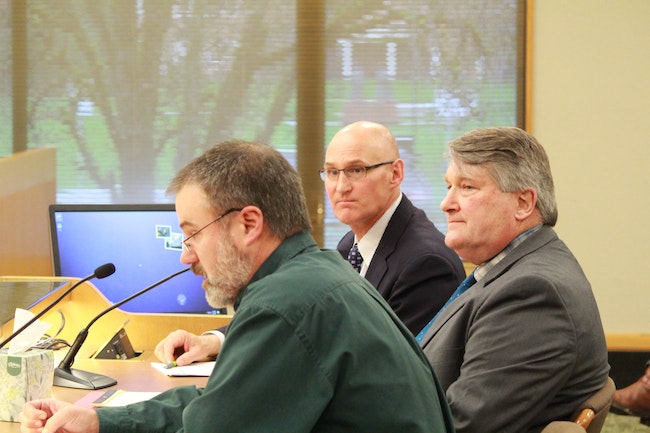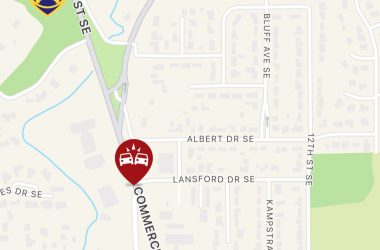 Ed Keith (left), Deschutes County forester; Phil Henderson, Deschutes County commissioner; and Nick Lelack, Deschutes County community development coordinator, share concerns about a wildfire bill in a Feb. 5 hearing. (Sam Stites/Oregon Capital Bureau)
Ed Keith (left), Deschutes County forester; Phil Henderson, Deschutes County commissioner; and Nick Lelack, Deschutes County community development coordinator, share concerns about a wildfire bill in a Feb. 5 hearing. (Sam Stites/Oregon Capital Bureau)
SALEM – Drastically improving the way Oregon fights wildfire could be facing more of an uphill political battle than lawmakers previously expected.
More than a dozen people from various organizations and local government showed up to the Senate Committee on Wildfire Response on Wednesday, Feb. 5, to express concerns over certain provisions laid out in the wide-sweeping legislation crafted on the recommendations of Gov. Kate Brown’s Council on Wildfire.
The legislation – Senate Bill 1536 – aims to modernize Oregon’s approach through new building code, land-use planning, mapping of high-risk areas, treatment of forest debris, mitigation of smoke on public health and forest protection.
But at Wednesday’s meeting, opposition was put on the record from Deschutes County officials, the Oregon Property Owners Association, conservation advocacy group Cascadia Wildlands, Sen. Herman Baertschiger, Jr., R-Grants Pass, vice chair of the Senate committee.
“A long time ago my dad said to me, ‘There’s a lot of things you want, and then there’s what you can afford,’” Baertschiger said. “That’s basically what we’re looking at here. This is a big state, it’s got a lot of fuels from one side to the other, but we’re only 4.3 million people. We’re not California, so we’re stuck in this dilemma of having a lot of things we want, but what can we afford?”
Deschutes County Commissioner Phil Henderson told the committee he and his two colleagues — Nick Lelack, community development director; and Ed Keith, Deschutes County forester — travelled from Bend to because their citizens are greatly concerned about the threat of smoke and wildfire to their communities which share nearly 80 miles of urban-wildland interface on the county’s west side. They expressed concern over certain mandates in the bill for Oregon’s counties, and whether they’d be funded to complete such tasks such as fuel reduction measures.
According to Henderson, Deschutes County has about 120,000 acres that are ready for treatment to reduce fuel loads, but much of that is U.S. Forest Service lands, and a partnership with the federal government would be required before pursuing treatment in those areas.
“Somehow the state has to prod the federal government, without that it’s not going to be possible,” Henderson said.
 Sen. Jeff Golden (D-Ashland) and Sen. Herman Baertschiger (R-Grants Pass), chair and vice chair of the Senate Committee on Wildfire Response, in a Feb. 5, 2020 hearing. (Sam Stites/Oregon Capital Bureau)
Sen. Jeff Golden (D-Ashland) and Sen. Herman Baertschiger (R-Grants Pass), chair and vice chair of the Senate Committee on Wildfire Response, in a Feb. 5, 2020 hearing. (Sam Stites/Oregon Capital Bureau)
Baertschiger, red pen in hand, went page-by-page through the legislation, rattling off sections of the bill he said required time of a full-length legislative session to discuss and hammer out details. According to Baertschiger, that’s a large portion of the bill, and includes sections on public utility risk planning, development on new state-wide risk reduction standards and measures, updating building codes, smoke abatement, emergency management and more.
“These are much longer conversations, and we probably need to wait for a longer session and much more in-depth conversation,” he said.
Baertschiger also pointed out that the state’s limited role on federal forests.
“We’re not going to have the say so of which lands and how to treat them. We’re not going to have that (say) even though we’re using our money. These are federal lands and they fall under federal jurisdiction,” he said. “We have to remember, this is complicated.”
After finishing his speech, Baertschiger turned to Brown’s natural resources advisor, Jason Miner, asking he had written everything down and was prepared to draft amendments based on his concerns. A laugh rang through the room — including from the Senate members and even Miner himself — as Baertschiger dropped his marked-up version of the bill in Miner’s hands.
Committee Chair Sen. Jeff Golden, D-Ashland, requested Miner look at ways to amend the bill to get the committee closer to agreeing on what could be done now and what can wait for 2021.
Golden said he hopes to analyze that approach after hearing more public testimony in their next meeting on Friday, Feb. 7, and then in a committee meeting on Monday, Feb. 10,
“There’s a lot here, obviously, and the two big baskets are, what can we do — another look at what’s realistic in this session, and what needs to wait for a longer conversation. The other one has to do with a jurisdiction authority, federal decisions and our decisions,” Golden said.
Contact Reporter Sam Stites: [email protected] or 971-255-2480.
CORRECTION: The Deschutes County forester is Ed Keith. His name was misspelled in an earlier version of the story but correct in the photo caption.









